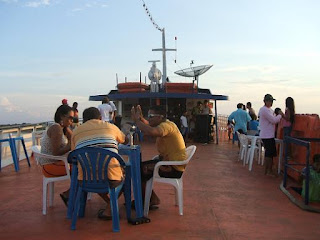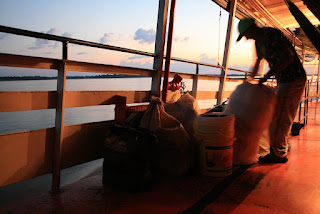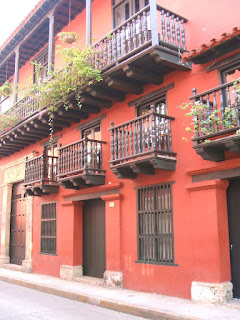The drums beat louder and louder, the intoxicating rhythmn quickening. The setting sun casts a golden light across the scene, and the unmistakable aroma of marijuana drifts through the dusk air. A brightly-dressed man in yellow robes marches gaily around the edge of the circle wafting clouds of incense from a brazier swinging aily by his side. Hundreds of voices cry out in unison, singing the first line of the shahada, the Muslim declaration of faith, "la illaha ila-llah, la illaha ila-llah, la illaha ila-llah, la illaha ila-llah". There is no god but Allah, there is no god but Allah. Everyone dances wildly, limbs flailing, heads thrown back, dreadlocks swinging. The chanting continues incessantly, "la illaha ila-llah, la illaha ila-llah". Even my feet are twitching now, as everyone in the crowd begins to sway in time to the music. A man breaks out of the circle and dances into the centre. Suddenly he is up on one leg, spinning manically, all the while chanting. "la illaha ila-llah, la illaha ila-llah". All around me, other dervishes break out of the circle and begin to spin around, chanting, always chanting, lost on their personal path to God.
This is about as far away from most people's image of Islam as it's possible to get, more Woodstock than Wahabi, in many ways closer to an ecstasy-fuelled Shoreditch rave than a veneration of Allah in one of the world's most strictly Muslim countries. Yet Islam it is, and hardly could there be a better example of Sudan's perplexingly contradictory attitude to religion than the Whirling Dervishes.
As has become well-known in the West, and particularly in the UK, in the last few days, Sudan is officially an Islamic republic, with Islamic Sharia - "street" - Law in operation, at least in the Arab north of the country. Indeed, prior to his now infamous sojurn in Taliban-controlled Afganistan, a certain well-known Saudi construction magnate and outspoken religious cleric spent five years resident in Sudan in the mid-1990s, departing only after intense American pressure forced the Khartoum government to expel him. From what I can discern, Sheikh bin Laden is a hero to the majority of Sudanese, as much for his unpublicised (in the West) philanthropy as his better known slaying of infidels. Most of the tarmac highways in Sudan (of which there are not many) were financed and built by Osama and his construction firm, as was the Port Sudan International Airport.
Yet perversely, bin Laden's strict Saudi Wahabi interpretation of Islam would be anathema to the Sudanese, who tend towards the much more laidback, mystical, Sufi strain of the religion, and incorporate many traditional tribal beliefs and practises into their faith. Such "un-Islamic" ideas as witchdoctors, exorcisms, and saints are apparently common in Sudanese Islam, while women openly converse or shake hands with unknown men (including strange white men with backpacks) without apparent fear of reprisal. Amazingly many Sudanese love having their picture taken, and unsolicited offers of pictures to unwary travellers are common. Local children in particular are often openly enraged at polite refusals - unable to believe that a khawaja (an affectionate term roughly equivalent to the Spanish "gringo" or the Thai "farang") could possibly ever venture outside without a camera. Most perversely of all, at least in the eyes of orthodox Islam, the Sudanese are apparently rather partial to alcohol, and despite the strict ban on the importation and sale of booze, homemade moonshine is apparently a big hit with locals, particularly in rural areas. (Suffice to say I have not tried it myself - a Spanish traveller I met who had, assured me that he was lucky to escape with his life. He was talking about the hangover, but the consequences of being caught don't really bare thinking about. Being arrested once in Sudan was careless, twice would surely be foolish.)
But as the unfortunate Gillian Gibbons and her teddy bear "Mo Mo" have found out this week, despite all the eccentricities of Sudanese Islam, it is after all a very important part of life here. Perhaps more so than any other Muslim country I have visited, Islam is a very public facet of Sudanese society. Walk along any street or sit in any hotel at one of the five allotted prayer times each day and there are countless hundreds of Sudanese, uniformly clad in their mostly immaculate white robes and skullcaps, kneeling on a mat or carpet in supplication to Allah, quietly muttering the shahada to themselves. This can pose a few logistical problems for the unbeliever, as it is supposedly considered very bad form to walk in front of a praying Muslim. No problem when said devotee is kneeling on the pavement of a wide street, but it is a different story when he is blocking the door of your hotel room, from which you need to exit at some speed in order to reach the bathroom down the corridor to deal with what you fear may in fact be a new and virulent strain of cholera. Allah apparently took pity on my pathetic state and has, as yet, neglected to smite me for the rather ungainly manner in which I hurdled two of his faithful on my way to the disgusting hole in the ground which doubles for a bathroom in the "Namarg" Hotel in Wad Medani earlier this week. Happily his mercy has also extended to granting me a reprieve from the more unpleasant symptoms of my mysterious stomach ailment. Allahu Akbar!
As I watched the dervishes twirling and whirling, my thoughts drifted back through time, and came to rest in roughly the same location a century or so earlier, with the brave men of the British Army who faced down a force of some forty thousand "dervish" devotees of the Sudanese Caliphate at the infamous Battle of Omdurman in 1898. Despite their vastly superior numbers, and their absolutely fervent belief in the power of Allah to bring victory, the dervish army were massacred in their thousands by the well-trained and crucially well-equipped forces. The Sudanese were a formidable foe: 15 years previously their fearless infantry charges had defeated the British and allowed the Mahdi - the self-appointed Islamic Messiah - to expel the anglo-Egyptian rulers of Sudan and famously to murder the Governor General, Charles "Chinese" Gordon in Khartoum. So impressed was Rudyard Kipling by the heroism of the Sudanese warrior-mystics, he eulogised them in his poem "Fuzzie Wuzzy". His admiring description, "You're a pore benighted 'eathen but a first-class fightin' man" might appear grimly familiar to modern British soldiers fighting Muslim foes in Afghanistan and Iraq.
After the performance had finished, I was approached by an array of curious locals, with whom I sat and drank tea. Some were Arab Muslims, some were not (the ethnically African south of Sudan is overwhelmingly Christian and/or Animist in its beliefs), but inevitably given our surroundings, the conversation eventually turned to religion. While the majority were simply curious about "Christian" ways (like most westerners in Muslim countries, when asked I pretend to be Christian, the concept of atheism not being well understood or well-regarded), it soon became apparent that one had a more sinister agenda, and he quickly began trying to back me into a corner. Despite my attempts at evasive diplomacy, the questions were relentless.
"What do you think of Islam?"
"Do you know that if you convert to Islam you will go to Paradise - if you don't you'll go to hell?"
"Why do Christians not believe in the Prophet Mohammed, Allah praise him?"
"Why do Christians allow their women to whore themselves?"
"Why do Christians...?
And so on and so forth. At this point I was getting a little flustered. Luckily, my audience shared my discomfort, and rounded on the interrogator angrily. Such was the vehemence with which he was condemned, my would be saviour slunk off into the night. The remaining Sudanese were appalled at this extremism, and clearly ashamed at the implied insults to a visitor in their country, and what's more to what Muslims call "people of the Book" - Christians and Jews. The apologies were sincere and profuse, and typical of the relaxed attitude to religion I have overwhelmingly found in Sudan. I finish with a quote from the Bradt Guide to Sudan, by Paul Clammer:
"More than just a religion, Islam is a social code that presents a specific way in which society should be run. As such, visitors have a particular responsibility to behave in a manner that's sensitive to local traditions, although the Sudanese are very tolerant and foreigners are usually forgiven for minor cultural gaffes."
Just be careful what you call your teddy bear.


 Hammock City.
Hammock City. 













